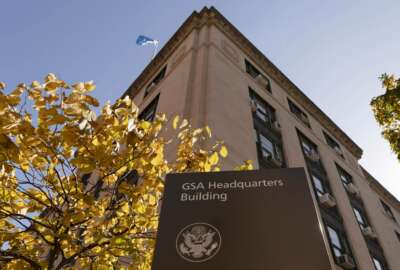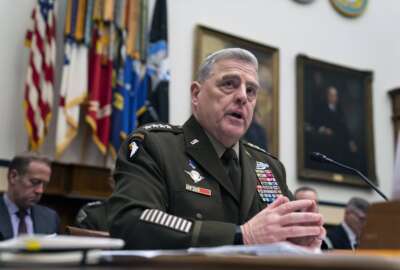GSA’s busy 2022 so far: Inflation, 876 and a new strategy
The Federal Acquisition Service has had a busy first six months of fiscal 2022, including trying to give contractors and agencies relief from inflation.
The General Services Administration’s coming spring 2022 update to its federal marketplace strategy caps off one of the busiest six months for the Federal Acquisition Service in recent memory.
It’s hard to remember a previous time when FAS was dealing with so many moving pieces. From the long-awaited move to the Universal Entity Identification number from the DUNS number, to the now much-maligned Polaris small business governmentwide acquisition contract (GWAC), to the unexpected challenges brought on by inflation which impacts nearly every aspect of the public and private sectors, the changes and updates have come fast and furiously since January.
So in case you missed some of the important work GSA has been doing over the last few months, here is a recap. This isn’t all-encompassing, but just highlights some of the significant memos, opportunities and items you may have missed.
Federal Marketplace Strategy 2022
Sonny Hashmi, the commissioner of the FAS, continues to make simplifying the buying and selling experience through the schedules and GWACs the organization oversees.
To that end, GSA said it will launch a new buyers’ experience effort based on human-centered design.
“This development will reduce pain points that federal agency buyers, suppliers and GSA acquisition professionals have mentioned in feedback,” GSA said in an April 13 release. “The updated buyer experience will offer buyers access to acquisition tools and market research solutions, as well as documents, templates and pricing resources to help plan acquisitions.”
GSA said its goals with these news tools are typical, reducing burdens, simplifying the customer agency’s experience and the like.
But digging deeper, FAS is trying to address some long-standing complaints about the menu of items it offers.
“That strategy will help to clarify government procurement options, qualification requirements, and the process of preparing to submit an offer,” GSA said. “Further, GSA is working to update the Multiple Award Schedule (MAS) Roadmap to simplify suppliers’ onboarding processes. Federal acquisition professionals have been working with industry to make it easier to get on the GSA Schedule, and GSA launched the new Vendor Support Center earlier this year so that all prospective and current MAS contract holders can find information and resources they need to do business with the government.”
While the specific details about the strategy are to come, if you review what Hashmi and FAS have been pursuing in the fall 2021 strategy it’s not difficult see what’s on tap.
Inflation adjustments still coming
GSA responded fairly quickly to contractors calling for help to deal with the 7.9% inflation the nation is facing.
On March 17, Jeff Koses, GSA’s senior procurement executive, and Mark Lee, the assistant commissioner in FAS’s Office of Policy and Compliance, temporarily changed requirements around the Economic Price Adjustment (EPA) contract clauses.
The four changes Koses and Lee outlined in the memo are:
- Lower the approval for price increases above the EPA clause ceiling from the contracting director to one level above the contracting officer;
- Relax time limitations on EPA increases;
- Relax limitations on the number of EPA increases a contractor may request; and
- Clarify that if a contractor has removed an item from their Schedule contract, GSA will not enforce the limitation on adding the same item back at a higher price.
“While EPA clauses normally act to protect GSA’s interests, in the current marketplace they make it harder for Federal agencies to acquire needed goods, services, and solutions. Contractors are removing items from the Federal Supply Schedules contracts to avoid selling at a loss. This particularly hurts new entrants and small businesses, the very firms the President’s initiatives around procurement equity are designed to support,” Koses and Lee wrote in the memo. “To ensure that GSA is able to continue offering a full range of products, services, and solutions, GSA must be flexible in how it applies these EPA contract clauses. Even with this added flexibility, contracting officers remain responsible for evaluating price increases and may accept them, negotiate them, or remove items from the underlying contract.”
GSA said the memo remains effective through Sept. 30.
While contractors applauded GSA’s quick action, the Coalition for Government Procurement recently raised some concerns about how FAS contracting officers are implementing the memo.
“Members are reporting that contracting officers are overlaying arbitrary (as in nowhere to be found in the Acquisition Letter) information requirements on contractor EPA submissions, effectively capping prices at certain levels without any nexus to contractor experiences in the market,” Roger Waldron, the Coalition’s president Roger Waldron wrote in an April 1 blog post. “In addition, the scope of these information requirements is broad, indeed, broader than would exist otherwise and seeking information that is beyond the right of contracting officers to request. All told, even if contractors were to comply with such information requests, the administrative delay associated with them would be onerous.”
The challenge with any of these memos is trying to drive it down to the contracting officers, and then once they know it exists, ensuring consistent implementation can be another hurdle.
The fact FAS seems to be struggling to drive down the consistent changes to its contracting officers is a bit concerning, especially given agencies have not planned well for inflation and the impact it’s having on vendors.
The Defense Department, for example, expected inflation to be 4%. DoD senior leaders told Congress on April 5 that the military is currently feeling the impacts of a higher inflation rate than assumed. However, DoD has not released any calculations on reduced buying power.
It’s worth watching how big of a factor inflation becomes over the next few months, especially as agencies must spend 12 months worth of funding in six months.
Price remains a factor on Schedules
One final decision GSA made that may have slipped under your radar came in February and was made public in March.
GSA decided not to use its authorities to remove price as an evaluation factor when awarding a contract, provided by under Section 876 of the 2019 Defense Authorization Act, for its schedules program.
After a series of listening sessions with industry and agency customers, GSA decided keeping pricing at the contract level, versus the task order level, preserves the MAS program’s current value.
“Customer agencies expressed deep concerns about moving the pricing negotiation requirement from the contract level to the order level. Most agencies stated that this move would significantly reduce the value that MAS contracts give them,” GSA wrote in a March 23 blog post. “Industry stakeholders were split. Some acknowledged it would save time. Others had concerns about their internal market research and increased procurement acquisition lead time (PALT) at the order level.”
In a white paper outlining its decision, GSA said an integrated project team conducted six listening sessions among agency and industry customers and came up with a “pros” and “cons” list as well as risks.
Among the reasons why GSA should implement 876 authorities under the schedules program included is the potential to reduce the workload of its contracting officers as well as industry support for the change.
Meanwhile, the list of reasons not to implement 876 authorities were much longer. These included GSA already ensures prices at the contract level are competitive and agencies can ask for further discounts at the order level based on volume buying, and contracting officers wouldn’t have to conduct a formal, negotiated procurement, as required under FAR Part 15, at the order level.
“Early talks with industry during the Office of Governmentwide Policy (OGP) listening sessions indicated the risk that there may be some level of industry backlash as a result of not implementing Section 876. While the IPT acknowledges that compared to customer agencies more of our industry partners are open to implementing Section 876, this initial discovery phase did not produce any solid evidence that industry would turn away from MAS if Section 876 was not implemented,” GSA wrote. “Instead the opposite was stated by some industry partners during the IPT’s interview. Some voiced the fear that implementation of Section 876 would put more burden on customer agencies and deter them from using the MAS Program. In addition, while some stated that they would rather be able to develop pricing at the order level, the majority of industry partners interviewed by the IPT acknowledged that there were benefits to having pricing at the contract level.”
GSA has used, or plans to use, Section 876 authorities for several large multiple award contracts, including the awards under ASTRO, the multiple award vehicle for manned, unmanned and robotic platforms. It’s also strongly considering its use for the upcoming new services multiple award contract.
Two more points emerged from the listening session. The first is that GSA should review the use of the Price Reduction Clause and Commercial Sales Practice. Both are seen as historical drags on the program. GSA has been working on moving away from the PRC and CSP for almost eight years, but hasn’t quite pulled the plug.
The second recommendation is the ability to manage Service Contract Labor Standards wage determinations and pricing at the task order level, rather than the contract level.
Copyright © 2025 Federal News Network. All rights reserved. This website is not intended for users located within the European Economic Area.
Jason Miller is executive editor of Federal News Network and directs news coverage on the people, policy and programs of the federal government.
Follow @jmillerWFED







